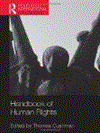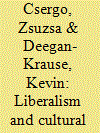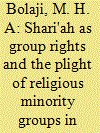|
|
|
Sort Order |
|
|
|
Items / Page
|
|
|
|
|
|
|
| Srl | Item |
| 1 |
ID:
129926


|
|
|
|
|
| Edition |
2nd ed.
|
| Publication |
Oxon, Routledge, 2012.
|
| Description |
xxiii, 744p.Hbk
|
| Standard Number |
9780415480239
|
|
|
|
|
|
|
|
|
|
|
|
Copies: C:1/I:0,R:1,Q:0
Circulation
| Accession# | Call# | Current Location | Status | Policy | Location |
| 057710 | 323/CUS 057710 | Main | On Shelf | Reference books | |
|
|
|
|
| 2 |
ID:
102827


|
|
|
|
|
| Publication |
2011.
|
| Summary/Abstract |
This article relies on cases from new EU member states in postcommunist Europe to integrate two overlapping debates about majority-minority relations. Since the Second World War, political theorists and international institutions have tended to discourage group-rights approaches in favour of individual rights; meanwhile, policy-makers who achieved interethnic peace in postcommunist Europe have often opted for group-rights approaches. On the basis of political theory, international norms and the conduct of political elites in this region, we argue that both the individual-rights and group-rights approaches can be differentiated internally along the dimension of pluralism - that is, their willingness to accommodate multiple processes of cultural reproduction. Moreover, both group-rights and individual-rights approaches can offer justifications for restricting minority cultural opportunities; furthermore, restrictive group-rights approaches sometimes cloak their efforts behind 'Western-sounding' individual-rights rhetoric. Likewise, both group-rights and individual-rights approaches can permit group accommodation that can lead to political integration. We find that de facto pluralist approaches to minority accommodation - often spearheaded by moderate parties of the majority in coalition with minority-group parties - encourage ethnic peace, regardless of their foundation in individual or group rights.
|
|
|
|
|
|
|
|
|
|
|
|
|
|
|
|
| 3 |
ID:
152302


|
|
|
|
|
| Summary/Abstract |
Many scholars have detected a decrease of political violence, but the causes of this decline remain unclear. As a contribution to this debate, we revisit the controversy over trends in conflict after the end of the Cold War. While many made ominous predictions of surging ethnic warfare, Gurr presented evidence of a pacifying trend since the mid-1990s and predicted a further decline in ethnic conflict in an article on ‘the waning of ethnic war’. Leveraging more recent data on ethnic groups and their participation in ethnic civil wars, this study evaluates if Gurr was right about the decline of ethnic conflict, and if he was right for the right reasons. We assess whether an increase in governments’ accommodative policies toward ethnic groups can plausibly account for a decline in ethnic civil war. Our findings lend considerable support to an account of the pacifying trend that stresses the granting of group rights, regional autonomy, and inclusion in power-sharing, as well as democratization and peacekeeping.
|
|
|
|
|
|
|
|
|
|
|
|
|
|
|
|
| 4 |
ID:
124497


|
|
|
|
|
| Publication |
2013.
|
| Summary/Abstract |
This article investigates how Shari'ah penal codes, as group-differentiated rights, jeopardize the rights of minority groups in northern Nigeria. The first section explores the concepts of individual and group rights in legal discourse. This is followed by an account of Shari'ah penal codes in northern Nigeria. Then, it examines the political expression of collective identity as group-differentiated rights, and how this expression of collective identity through Shari'ah law has endangered the rights of the members of minority religious groups in northern Nigeria. The paper concludes that, to address the emerging dysfunctional dimensions of Shari'ah, government must work with Islamic civil organizations so as to emphasize the welfare aspects of Shari'ah, and liaise with reputable northern Nigerians to appeal to the members of the Boko Haram to lay down their arms.
|
|
|
|
|
|
|
|
|
|
|
|
|
|
|
|
|
|
|
|
|